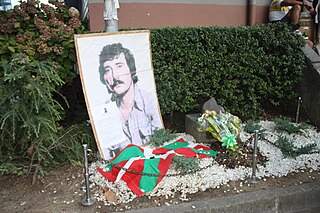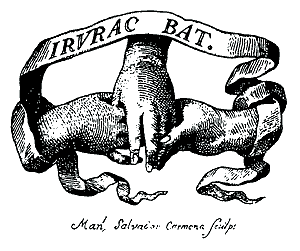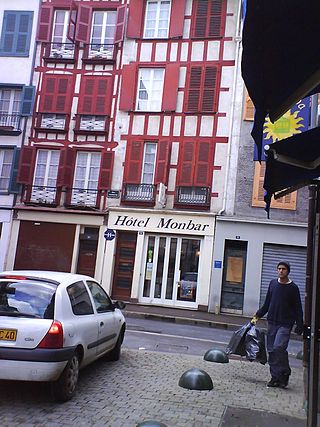
GAL were death squads illegally established by officials of the Spanish government during the Basque conflict to fight against ETA, the principal Basque separatist terrorist group. They were active from 1983 to 1987 under Spanish Socialist Workers' Party (PSOE)-led governments.
Cantera, literally meaning "quarry" in Spanish, is a term used in Spain to refer to youth academies and farm teams organized by sports clubs. It is also used to refer to the geographical area that clubs recruit players from. The term is widely used in football but is also applied to other sports, such as basketball. This article, however, is about the football canteras. Notable canteras include those of Athletic Bilbao, Real Sociedad, Real Madrid, Barcelona, Atlético Madrid, Espanyol, Sporting de Gijón, Celta de Vigo and Valencia.

Aviron Bayonnais, commonly called Bayonne, is a French rugby union club from Bayonne in Pyrénées-Atlantiques which, for the 2016-17 season, competed in the top tier of the French league system, in the Top 14 competition. In the 2015–16 Rugby Pro D2 Season they were promoted after finishing 2nd and winning the playoff final against Aurillac. In the 2016-2017 season, they finished in last place, and will be relegated back to Pro D2 for the 2017-18 season. Founded in 1904, they play at the Parc des Sports also known as Stade Jean-Dauger in Bayonne. Their mascot is a pottok pony called pottoka. They have ties to the French Basque community.

Euskaltel–Euskadi was a professional road bicycle racing team from Spain, Europe. The team was commercially sponsored, but was also partly funded by the Basque Government until the end of 2013, with riders either from the Basque Country, Navarre, La Rioja, and the French Basque Country, or who had grown up in the cycling culture of those regions: This policy was abandoned to enable retention of World Tour status. Its sponsor was Euskaltel, a Basque telecom company. Euskaltel–Euskadi was famous for its all-orange team kits. Whenever the Tour de France passed through the Basque Country many spectators lined the route dressed in the team's orange or the colours of the Basque flag. The Euskaltel team also has a second team inside the "Fundacion Euskadi", this team rode in a continental category, the name of the team was Orbea. This team was created with the aim of forming the young cyclist before going to the Euskaltel–Euskadi.
The Basque Country national football team represents the Basque Country in football. It selects players from the Basque Country autonomous community, Navarre and the French Basque Country and is organised by the Basque Football Federation. It is not affiliated with FIFA or UEFA and therefore only allowed to play friendly matches against FIFA or non-FIFA affiliated teams.
Communist Movement of Euskadi was originally the branch of the Communist Movement (MC) in Basque Country and Navarre, Spain. EMK was previously known as ETA Berri, a splinter group of ETA. EMK separated itself from MC in 1983. In 1991 EMK merged with LKI and formed Zutik in Basque Country. In Navarre EMK took part in forming Batzarre. Some of its most prominent leaders were Patxi Iturrioz, Eugenio del Río, Rosa Olivares Txertudi, Milagros Rubio, Jesús Urra Bidaurre and the brothers Javier and Ignacio Álvarez Dorronsoro.
José Antonio Sistiaga Mosso was a Spanish Basque artist and experimental filmmaker best known for his feature-length hand-painted "direct" film, "Era erera baleibu izik subua aruaren" (1968–70). He lived and worked in the Basque Country, between Ciboure and San Sebastian.
Many Basques arrived in Chile in the 16th, 17th, 18th, 19th and early 20th century from their homeland in northern Spain and parts of southwestern France, as conquistadors, soldiers, sailors, merchants, priests and labourers. Due to their traditional hard work and entrepreneurship, many of them rose to the top of the social scale and intermarried into the Chilean elites of Castilian descent, giving birth to the new Basque-Chilean aristocracy in Chile. This union is the basis of the Chilean elite of today. But also, they immensely contributed to the ethnic make up of the bulk of the Chilean population. The Basque settlers also intermarried into the Mestizo and Castizo population of central Chile in the middle of the colonial period to form the large Criollo population that exists in Chile today; Castizos create modern middle and lower classes. Many years after the first waves of settlers, thousands of Basque refugees fleeing Spanish Civil War in 1939 also settled and have many descendants in the country and have even intermarried with Spanish ethnic groups other than Castilians, and other European ethnic groups. An estimated 1.6 million (10%) to 5 million (30%) Chileans have a surname of Basque origin. This figure is to the least as the number of Basque descendence is great and plentiful. Due to Basque migration, Chile has a higher number of people of Basque descent than the Basque Country itself.

The Basque Country, also called the Basque Autonomous Community, is an autonomous community in northern Spain. It includes the Basque provinces of Álava, Biscay, and Gipuzkoa. It also surrounds an enclave called Treviño, which belongs to the neighboring autonomous community of Castile and León.
The Catalonia rugby union team is the national and/or representative rugby union team of Catalonia. It is organised by the Catalan Rugby Federation and has been active since 1923. On 14 April 1934 they made their international debut with a 5–5 draw at the Camp de Les Corts against Italy.
Basque Mexicans are Mexicans of full, partial, or predominantly Basque ancestry, or Basque-born persons living in Mexico.

The Royal Basque Society of Friends of the Country, also known as La Bascongada or Bascongada Society, was founded in the mid-18th century to encourage the scientific, cultural and economic development of the Basque Country.

The Monbar Hotel attack was carried out by the Grupos Antiterroristas de Liberación (GAL), a Spanish state-sponsored death squad, on 25 September 1985 in Bayonne, Pyrénées-Atlantiques, France. The targets were four members of the Basque separatist terrorist group Euskadi Ta Askatasuna (ETA), whom the Spanish government believed to be senior figures in the organization, itself proscribed as a terrorist group in Spain and France. All four people were killed, with a fifth person, apparently unconnected to ETA, injured in the shooting. This represented the deadliest attack carried out by the GAL. Although two of the participants were apprehended shortly after the shooting, controversy surrounded the possible involvement of senior figures in the Spanish police.

Euskadi Roja or Euzkadi Roja was a newspaper published by the Basque-Navarre Federation of the Communist Party of Spain. Parts of the newspaper was printed in Euskera.
Basque Country women's national rugby union team is the national and/or representative women's rugby union team of the Basque Country. It is organised by the Basque Rugby Federation and has been active since 1994–95. Unlike the men's team, the Basque Country women's team have only played a small number of international games. They regularly play friendlies against club and provincial teams.
The Spanish Regions Championship is a rugby union competition in Spain featuring the representative teams of the autonomous communities. The competition is organised by the Spanish Rugby Federation. The Basque Country were the inaugural winners in 1983–84. They are also the competitions most successful team. The competition is usually played as a knockout tournament. However it has occasionally adopted a league system.

Juan María Uriarte Goiricelaya was a Spanish Roman Catholic prelate. He was bishop of Zamora from 1991 to 2000 and San Sebastián from 2000 to 2009.







